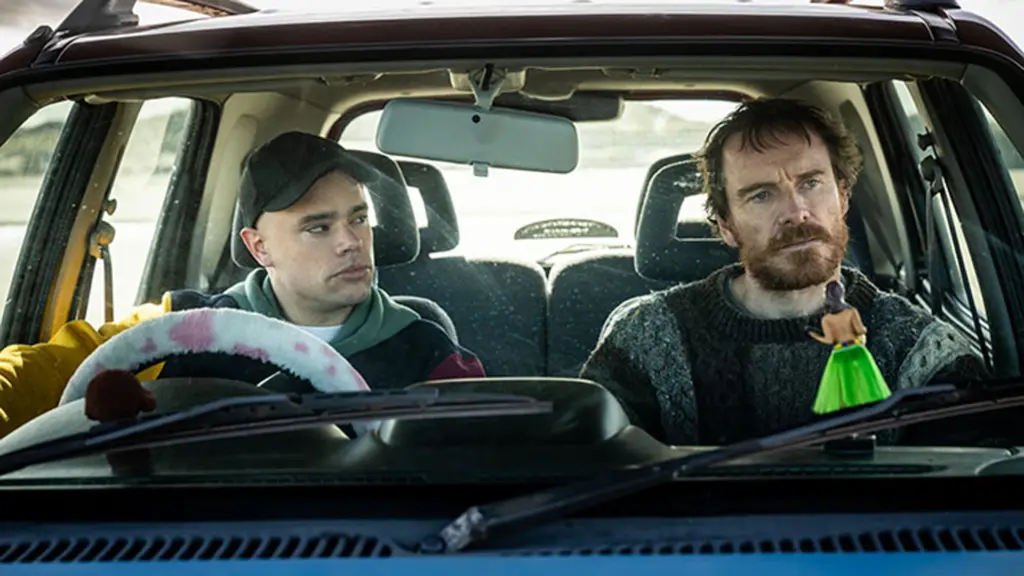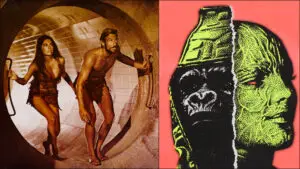As Kneecap cheekily reminds us in its opening moments, it would be nearly impossible to tell a modern Irish story without mention of civil strife. The Irish struggle for independence goes so far back, you’d be hard-pressed to find any film about the country, or its northern counterpart, that doesn’t incorporate it in some form. Examples are as plentiful today as ever, from Kenneth Branagh’s Belfast (2021), covering the Troubles, to Martin McDonagh’s The Banshees of Inisherin (2022), featuring as its backdrop the Irish Civil War. Still, it’s rare to find a film that tackles the subject with the verve and good humor of Kneecap.
Choosing for its vehicle the eponymous Hip Hop trio from Belfast, Kneecap uses the group’s ascendency to tell a new kind of story: a story not about the Troubles themselves, but about the experience of growing up in a country so culturally consumed by its divided past.
If going in blind, you would be forgiven for confusion as to the group Kneecap’s authenticity. Though advertised as a kind of “true story,” it is obvious within minutes that large creative liberties have been taken with the source material. So much so, I assumed for the bulk of the film that Kneecap were fictional characters. It was not until the credits rolled, accompanied by backstage footage of their tours and performances dating back to 2017, that it became clear they were not only a real group, but had played themselves in the film.
Fundamentally, Kneecap does a rare thing: forgoing any bothersome obligations to the truth, it tells a fun and engaging story that’s more concerned with the point. It’s difficult to think of an analogue; Howard Stern’s Private Parts (1997) might come close, but Kneecap’s subjects are magnitudes more endearing.
Kneecap centers on Naoise Ó Cairealláin, Liam Ó Hannaidh and JJ Ó Dochartaigh, who star as themselves in 21st-century Belfast. Whatever the group’s true origins, the film purports that Naoise and Liam met as young boys, and were taught to speak their native Irish Gaelic by Naoise’s father Arlo (Michael Fassbender), a one-time hero of the republican paramilitary. In Belfast circa 2016, with Arlo now in hiding and presumed dead by police, JJ and Liam first meet at a police station after Liam’s drug arrest at a local party. Liam, ever the stalwart republican, refuses to speak English to the police.
JJ, a local music teacher tasked with the job of interpreter, is taken with the Irish lyrics he finds in Liam’s confiscated notebook. After chance reunites them, JJ urges Liam and Naoise to make use of his studio and production skills to bring their roguish lyrics to life. Together the trio begin recording music, with JJ donning an Irish flag ski mask and the moniker DJ Próvai, and the other two inducting him into a life of drug-filled, politically minded debauchery.

Make no mistake: Kneecap is an unapologetically drug-positive film, the likes of which we have not seen in decades. Whatever you think of the stance, it is refreshing to dodge a typically weepy drug confessional.
Amid rising tension and marches for the Irish Language Act, a law which would acknowledge Irish as an official minority language, Kneecap comes to prominence with their underground drug-fueled shows championing their native tongue, marking the trio as unlikely bannermen for the movement.
While I hesitate to compare a film so concerned with Irish independence to others from the British Isles, tonally Kneecap borrows more from Danny Boyle’s Trainspotting (1996) or Guy Ritchie’s Lock, Stock and Two Smoking Barrels (1998) than it does from any contemporary films about Ireland. It’s a heavily narrated, self-referential affair, full of scrawls of on-screen text, cartoonish flourishes, playful camera moves and thumping needle drops. Though a bit clumsier in execution than those just mentioned, Kneecap is so brimming with good nature that it’s difficult to fault.
The music of Kneecap goes a long way in this regard. Kneecap’s original material underpins the whole jaunt with constant refrains, and it is an unending string of toe-tapping earworms. Their style has little to do with contemporary Hip Hop, bearing more commanality with the wealth of electronic dance music throughout the 1990s and early 2000s from Ireland and the UK. Their original songs are bolstered with a driving soundtrack from, or reminiscent of, that period, with well-placed tracks from the likes of Orbital, Bicep and The Prodigy.
All three bandmates are given story credits, as is director Rich Peppiatt. Having previously teamed with Kneecap on a 2021 music video, Kneecap is his feature debut. Together, they have crafted something that seems to succeed against all odds. The entire mode of storytelling is dated in a way that should feel cloying, but somehow – doesn’t. Though crass and self-indulgent, Kneecap is full of sentimentality and feel-good moments that are surprisingly effective.
Fassbender turns in an effortless performance as always, as does Simone Kirby as his estranged wife. An argument between the two sticks out as one of the better written and acted sequences of the film. The trio themselves are bizarrely magnetic first-timers. All of them could go on to have on-screen careers, and seem entirely capable of playing characters not based on themselves.
As a story of generational trauma and the struggle for indigenous rights against a colonizer, Kneecap succinctly draws a connection between the plight of the Irish and other similar struggles, past and present, around the world. It is by no means revelatory, but it magically sidesteps so many pitfalls that could have led to a saccharine, juvenile mess. What we’re left with is retro yet fresh, and a winner.
Was Naoise’s father a legend of Irish independence? Was JJ’s girlfriend the spokeswoman for the Irish Language Act? Did the trio toss fistfuls of ketamine from the stage at massive, high-profile gigs? Probably not. But it’s more fun this way. Kneecap won’t shake your foundations, but it will shake your PA.














